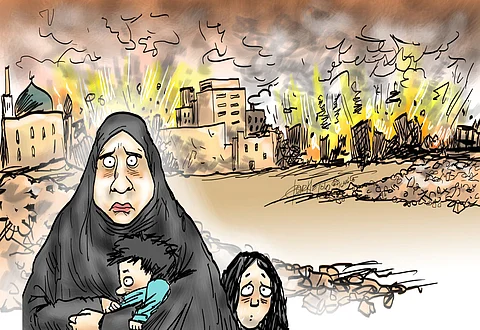
- NEWS
- the EDIT
- COMMENTARY
- BUSINESS
- LIFE
- SHOW
- ACTION
- GLOBAL GOALS
- SNAPS
- DYARYO TIRADA
- MORE

Nearly two years since Hamas’ 7 October 2023 attack on Israel, the war in Gaza has reached a critical juncture. Despite a prolonged military campaign, Israel’s Prime Minister Benjamin Netanyahu has failed to achieve his core objectives: Hamas’ complete destruction; the safe return of all hostages; and the elimination of Gaza as a threat to Israel.
His goals unmet, Netanyahu now appears set on a full military occupation of Gaza, a move fraught with strategic and geopolitical risks. Realizing that end will be done amid one of the most severe humanitarian crises in modern times.
Decades of Israel-imposed blockades have restricted people, goods, medical supplies, and food in and out of Gaza. The prolonged isolation has weakened Gaza’s economy, leaving an estimated 80 percent of the population reliant on aid, according to a 2023 UNCTAD study.
The situation has sharply deteriorated with the escalation of military operations in the aftermath of the 7 October Hamas attack. Israeli airstrikes and ground attacks have destroyed homes, hospitals, water systems, and key infrastructure, leaving over two million Gazans in need of humanitarian support.
Since March 2025, relief supplies have been almost entirely blocked from entering Gaza. Hungry residents are surviving on an average 245 calories per day, or less than 12 percent of the minimum requirement, forcing families to subsist on wild plants and herbs, according to a recent Oxfam report.
Hunger in Gaza is surging to record levels, with nearly half a million people in dire circumstances, suffering from malnutrition, in urgent need of nourishment and medical assistance.
Meanwhile, the ongoing military operations make the entry of food and medicine into Gaza even more perilous. Civilians, particularly women and children, are bearing the brunt of the turmoil.
There have been repeated pleas by various international organizations for a ceasefire and urgent aid to prevent further loss of life and suffering. However, political and ideological disagreements and security concerns hamper intervention.
Beyond the shedding of tears in sympathy and the cries of outrage over the starvation and unceasing bombardment of Gaza, indiscriminately decimating children, women, the elderly, and now journalists, the world must make serious calls for immediate intervention by global leaders because the human cost is dire and beyond appalling.
The suffering of civilians in Gaza is intolerable, and their basic rights to life, health, and dignity, are at grave risk. World leaders and organizations have a moral responsibility to intervene by providing humanitarian aid, pressuring the warring parties to cease hostilities and come to a dialogue aimed at a sustainable and peaceful resolution.
All these concerns, however, seem to take a backseat in Netanyahu’s mind as he pursues his objective of the complete eradication of Hamas — believing that only direct, long-term Israeli control of Gaza can prevent a resurgence of the terrorist group.
Netanyahu argues that half-measures like limited raids or reliance on unstable Palestinian governance had failed in the past. And Israel cannot risk another bloody 7 October debacle.
The argument is that a sustained occupation of Gaza will allow for a thorough demilitarization of Hamas and the establishment of a more pliable post-war order.
A strong argument, yes, but that approach risks severe downsides. First, Israel lacks a viable exit strategy. Occupying Gaza indefinitely would drain its military resources, entangle its troops in a perpetual insurgency, and divert focus from the other pressing threats against Israel.
Likewise, global condemnation, already at a peak, could escalate further, isolating Israel even more politically and economically, with the US and other allies imposing harsher conditions for their support.
Then there’s the probability of radicalization and continued violence. History shows occupation fuels resentment, retaining whatever popular appeal there is for Hamas or its successor. Without a more viable political solution, Israel risks trading short-term control for long-term instability.
A full takeover also reflects a failure of imagination. More sustainable options such as a negotiated ceasefire with hostage releases, a transitional Arab-led security force, or a revitalized Palestinian Authority have been dismissed by Netanyahu’s government.
Netanyahu’s reluctance to consider these alternatives could very well be a matter of political survival: prolonging the war delays elections and shields him from accountability for pre-7 October security failures.
It has also been pointed out that Netanyahu’s move for full military control is less a solution than an admission of policy failure.
Occupying Gaza sans a credible plan for governance, reconstruction, or regional cooperation risks perpetuating the very threats Israel seeks to eliminate.
The path forward demands not more occupation, but difficult compromises — something Netanyahu refuses to entertain. Observers say that if he proceeds, Gaza’s agony will deepen, Israel’s security will remain precarious, and the cycle of violence will continue.
And, as the world awaits what will happen next to that hapless spot on earth, the people — children, women, the elderly — of Gaza are either starving to death or are being blasted to smithereens.
